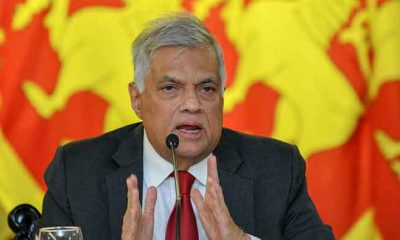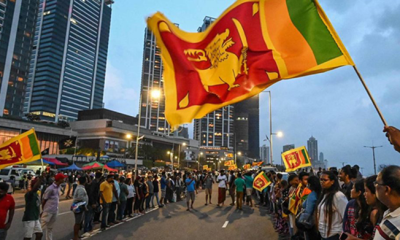News
Lanka’s poor surge by 4 Mn to 31-pct of population: Survey

ECONOMYNEXT –Sri Lanka’s poor has surged by 4 million to 7 million since 2019 to 31 percent of the population in 2023, a survey has found as the country was hit by the worst currency crisis in the history of its central bank.
A 10,000 person survey by LirneAsia, a regional policy research organization, found that 33 percent of the respondents had skipped a meal and 47 percent reduced their meal sizes, after the currency crisis.About 27 percent of adults restricted their meals to feed children. The survey was conducted from October 10, 2022 to May 12, 2023.
Sri Lanka started an output gap targeting exercise (Keynesian stimulus) printing large volumes of money and a so-called flexible exchange rate backed by inconsistent policy collapsed in 2022 from 200 to 360 to the US dollar, tearing apart the monetary foundations of families, destroying real salaries and jobs.
Food prices soared partly due to a global commodity bubble fired by the Federal Reserve and also import restrictions from forex shortages and disruption to agriculture from a fertilizer ban.
Agro-chemicals were bannd to ‘save’ 300 to 400 million dollars in foreign exchange, the government said at the time.Rohan Samarajiva Chair of LirneAsia said he searched for historical data and found a thesis done by one M Salgado, which estimated gross domestic product during the Great Depression.
“He talked about the Great Depression affecting Sri Lanka and how our per capita income, which was about 80 dollars, went down by about half over a period of four years,” Samarajiva told a forum where research findings was released.
The Great Depression was a ‘deflationary collapse’ during the 1930s came in the wake of the Federal Reserve firing the ‘roaring 20s bubble’ after accidentally inventing the policy rate giving power to economists to mis-target interest rates, analysts have said.
Sri Lanka at the time however did not have a central bank to trigger a currency collapse. Food prices fell steeply during the Great depression. In a central bank currency crisis, the worst hit are wage earners whose salaries do not go up as prices rise with a collapse of the value of domestic money.
From March 2023, Sri Lanka central bank has appreciated the currency with deflationary policy, allowing food prices to fall.
In Sri Lanka poverty among Sri Lanka’s plantation worker families was already high at 31 percent by 2019, based on a household income and expenditure survey (HIES 2019) of the state statistics office.
“This has worsened in 2023. Now more than half our estate workers are living below the poverty line,” Tharaka Amarsinghe, a researcher at LIRNEasia said.
“Now more than half our estate workers are living below the poverty line.”
In the rest of rural Sri Lanka poverty has doubled from 15 to 32 percent from 2019 to 2023.In urban areas, which are densely populated, poverty tripled to 6 to 18 percent.About 32 percent of families had sold household assets and 50 percent had run down their savings.
Another 6 percent did not send their children to school, indicating that 203,000 children did not attend school. Parents had mentioned that they did not have exercise books and had to make up books from empty pages of old books, according to a panelist.Sri Lanka has a number of government income support programs, chief among them known as Samurdhi.
The survey found that 1.7 million families got Samurdhi benefits but only 40 percent were poor or below the official poverty line Gayani Hurrulle, Senior Research Manager at LirneAsia said. About 4 percent were in the richest income decile, 5 percent were in the next.
Only 17 percent who were on Samurdhi benefits have exited the program. Opaque criteria including attending political meetings were used by Samurdhi officials to admit new applicants, respondents to the survey had said.
News
US sports envoys to Lanka to champion youth development

The U.S. Embassy in Colombo welcomed the U.S. Sports Envoys to Sri Lanka, former National Basketball Association (NBA) and Women’s National Basketball Association (WNBA) players Stephen Howard and Astou Ndiaye, from June 8 through 14.
The Public Diplomacy section of the U.S. Embassy said that it would launch a weeklong basketball program intended to harness the unifying power of sports, made possible through collaboration with Foundation of Goodness and IImpact Hoop Lab.
While in Sri Lanka, Howard and Ndiaye, both retired professional basketball players, will conduct a weeklong program, Hoops for Hope: Bridging Borders through Basketball. The Sports Envoys will lead basketball clinics and exhibition matches and engage in leadership sessions in Colombo and Southern Province for youth aged 14-18 from Northern, Uva, Eastern and Western Provinces, offering skills and leadership training both on and off the court. The U.S. Envoys will also share their expertise with the Sri Lanka Basketball Federation, national coaches, and players, furthering the development of basketball in the country. Beyond the clinics, they will collaborate with Sri Lankan schoolchildren to take part in a community service project in the Colombo area.
“We are so proud to welcome Stephen and Astou as our Sports Envoys to Sri Lanka, to build on the strong people-to-people connections between the United States and Sri Lanka,” said U.S. Ambassador Julie Chung. “The lessons that will be shared by our Sports Envoys – communication, teamwork, resilience, inclusion, and conflict resolution – are essential for leadership development, community building, equality, and peace. The U.S. Sports Envoy program is a testament to our belief that sports can be a powerful tool in promoting peace and unity.”
News
Rahuman questions sudden cancellation of leave of CEB employees

SJB Colombo District MP Mujibur Rahuman in parliament demanded to know from the government the reasons for CEB suspending the leave of all its employees until further notice from Thursday.
MP Rahuman said that the CEB has got an acting General Manager anew and the latter yesterday morning issued a circular suspending leave of all CEB employees with immediate effect until further notice.
“We demand that Minister Kanchana Wijesekera should explain this to the House. This circular was issued while this debate on the new Electricity Amendment Bill was pending. There are many who oppose this Bill. The Minister must tell parliament the reason for the urge to cancel the leave of CEB employees,” the MP said.However, Speaker Mahinda Yapa Abeywardena prevented Minister Wijesekera responding to the query and said that the matter raised by MP Rahuman was not relevant.
News
CIPM successfully concludes 8th Annual Symposium

The Chartered Institute of Personnel Management (CIPM) successfully concluded the 8th Annual CIPM Symposium, which took place on 31st May 2024. Themed “Nurturing the Human Element—Redefining HRM in a Rapidly Changing World,” the symposium underscored the pivotal role of human resource management (HRM) in today’s dynamic global landscape. Since its inception in 1959, CIPM has been dedicated to advancing the HR profession through education, professional development, and advocacy, solidifying its position as Sri Lanka’s leading professional body for HRM.
Ken Vijayakumar, the President of the CIPM, graced the occasion as the chief guest. The symposium commenced with the welcome address by the Chairperson, Prof. Arosha Adikaram, followed by the Web Launch of the Symposium Proceedings and Abstract Book by the CIPM President. The event featured distinguished addresses, including a speech by Chief Guest Ken Vijayakumar, President of CIPM, and an address by Guest of Honor Shakthi Ranatunga, Chief Operating Officer of MAS Holdings Pvt. Ltd., Sri Lanka.
The symposium also featured an inspiring keynote address by Prof. Mario Fernando, Professor of Management and Director of the Centre for Cross Cultural Management (CCCM) at the University of Wollongong, Australia.
Vote of Thanks of the inauguration session was delivered by Dr. Dillanjani Weeratunga, Symposium Co-chair.
The symposium served as a comprehensive platform for researchers to present their findings across a wide range of critical topics in HRM. These included Cultural Diversity and Inclusion, Talent Development and Retention, Ethical Leadership and Corporate Social Responsibility, Adapting to Technological Advancements, Mental Health and Well-being at Work, Global Workforce Challenges, Employee Empowerment, and Reskilling and Upskilling.
The plenary session was led by Prof. Wasantha Rajapakse. Certificates were awarded to the best paper presenters during the valedictory session, followed by a vote of thanks delivered by Kamani Perera, Manager of Research and Development.
The annual symposium of CIPM was a truly inclusive event, attracting a diverse audience that spanned undergraduates, graduates, working professionals, research scholars and lecturers. This widespread interest highlights the symposium’s significance in the field of HRM, offering a unique opportunity for everyone to network and learn from scholarly brains.The CIPM International Research Symposium was sponsored by Hambantota International Port, Sri Lanka Institute of Information Technology (SLIIT), E B Creasy & Co. PLC, and Print Xcel Company.
























